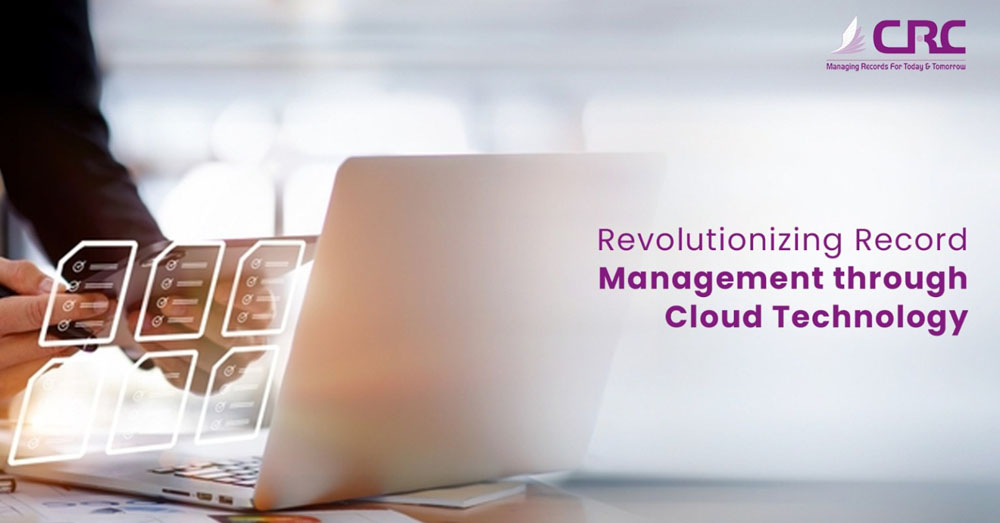In recent years, cloud technology has become increasingly popular across many different industries, including record management. Thanks to the numerous benefits offered by cloud-based record management systems, more and more organizations are turning to these solutions to store, manage, and protect their critical business records.
What is cloud-based record management?
So, what exactly is cloud-based record management, and how does it work? Essentially, cloud-based record management involves storing and accessing business records via the internet, rather than on physical servers or hardware. This allows for easy access to records from anywhere with an internet connection, and eliminates the need for organizations to manage their own servers or hardware.
Benefits
One of the key benefits of cloud-based record management is increased flexibility and accessibility. Because records can be accessed from any device with an internet connection, employees can easily retrieve the records they need, regardless of where they are working from. This can be especially useful for remote teams, as well as for employees who need to access records while on the go.
Improved business records
In addition to increased flexibility, cloud-based record management also offers improved security for critical business records. Cloud-based systems are typically protected by robust security measures, including firewalls, encryption, and multi-factor authentication. This helps to ensure that records are protected from unauthorized access, theft, or data breaches.
Scalability
Another benefit of cloud-based record management is scalability. Cloud-based systems can be easily scaled up or down as needed, depending on an organization’s needs. This means that organizations can quickly and easily add or remove storage space, users, or features as their needs change over time.
Automation of records
One key advantage of cloud-based record management is the ability to automate many record management processes. For example, many cloud-based systems include features like automatic record retention, which can automatically delete records that are no longer needed after a specified period of time. This can help to ensure that organizations are in compliance with regulatory requirements, and can also free up time for employees who would otherwise need to manually manage record retention.
Optical Character Recognition
In addition to automating record retention, many cloud-based record management systems also include features like OCR (optical character recognition) and indexing, which can make it easier to search for and find specific records. This can save employees a significant amount of time and effort, as they no longer need to manually sift through large amounts of records to find the information they need.
Reduced Costs
Finally, cloud-based record management can also help to reduce costs for organizations. Because cloud-based systems eliminate the need for organizations to manage their own servers or hardware, they can save money on hardware costs, maintenance, and IT staffing. Additionally, cloud-based systems often offer flexible pricing options, which can be tailored to an organization’s specific needs and budget.
Downsides of cloud-based record management
Of course, as with any technology, there are also potential downsides to cloud-based record management. One concern is the potential for data breaches or security vulnerabilities. While cloud-based systems are generally very secure, it’s important for organizations to take steps to ensure that their data is properly protected, such as by implementing strong passwords, encryption, and multi-factor authentication.
Another potential downside of cloud-based record management is the need for reliable internet access. If an organization experiences internet outages or slow speeds, this could impact their ability to access critical records in a timely manner. To mitigate this risk, it’s important for organizations to have a backup plan in place, such as by storing important records locally as well as in the cloud.
Despite these potential downsides, the benefits of cloud-based record management are clear. By leveraging cloud technology, organizations can enjoy increased flexibility, scalability, security, automation, and cost savings. As more and more organizations turn to cloud-based record management, it’s likely that we will continue to see even more innovative and advanced solutions in the years to come.
CRC – A reliable cloud-based record management partner
CRC, Capital Record Centre is a renowned Delhi-based record management company. Choosing CRC’s cloud-based record management solutions is a smart business decision. With their advanced technology and expertise, they can help you streamline your workflows, enhance your data security, and improve your overall business operations. At CRC, they understand the importance of managing your records efficiently and securely, and they’re committed to providing you with the best solutions possible. So, if you’re ready to take your record management practices to the next level, choose CRC cloud-based solutions and experience the benefits for yourself. Visit CRC, to know more!


